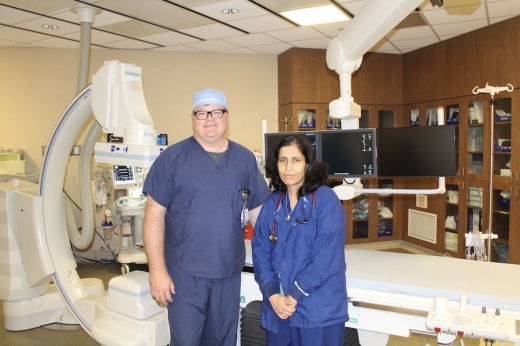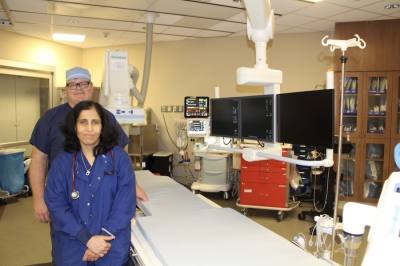He said he experienced chest pain and pain radiating down his left arm.
“It felt like someone poking a hot knife into my chest,” he said.
He thought he was having a heart attack. After advising his partner, they went to Texas Health Presbyterian Hospital Flower Mound, where Berryhill was treated at the hospital’s new cardiac catheterization lab, which opened in July 2023.
Berryhill, 53, discovered he had a “heart event”—a myocardial bridge, a condition he was born with and something that never caused him previous issues. Dr. Geetha Ramaswamy, an interventional cardiologist at Texas Health Flower Mound, performed the angiogram to check for blockage. Angiograms are pictures of a patient’s heart and blood supply of the heart, Ramaswamy said. With that procedure being conducted in the new catheterization lab, Berryhill could get his tests performed onsite.
He said he had a good experience at Texas Health Flower Mound, describing the staff as “spectacular,” as the doctor needed little time to diagnose his problem.
“It was brand new,” he said about the lab. “I was only the second patient in there.”
The background
Both Ramaswamy and Lab Manager Tommy Leathers said the lab provides convenience in that it can treat local patients immediately without them having to leave town and is versatile in that it can conduct various procedures. Among the procedures that can be performed are heart catheterizations, cardiac angiograms and peripheral angiograms, which are angiograms that specialize in arteries that supply blood to the arms, hands, legs and feet.
In the lab, Ramaswamy showed the X-ray unit and the adjoining monitors and discussed tests that are performed.
“It varies based on what they have [tested],” Ramaswamy said regarding how long a patient is treated in the lab. “It could be as short as 20 minutes and as long as an hour, hour and a half.”
A closer look
She said the lab has been “fantastic,” and thinks patients have the same view, as they and their families can stay nearby for procedures.
“Likewise, I think it’s been a real game changer for people who have peripheral artery disease,” she said, noting that disease and coronary artery disease are the two critical diseases treated at the lab.
She said the lab has expanded its crew to seven since opening and will add other procedures in the future. Plans are in the works to expand the physical space as well.
Ramaswamy said the lab eventually hopes to start conducting angiograms that can be performed in a “super urgent fashion” for a specific type of heart attack.
The outlook
The lab has been steadily getting busier, Leathers said.
“We took it slow to begin just because we were opening up a new service here, but we’ve steadily been picking up business,” Leathers said.
He said the lab sees about an average of five people per day. Half come from outpatient services and the other half from the emergency department.
“We are continuing to grow,” he said. “We are putting in a budget [request] for getting new state-of-the-art X-ray equipment, which will hopefully be done within the next year.”






